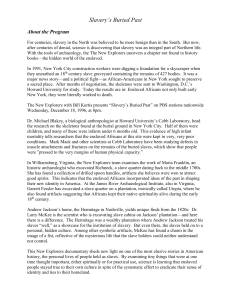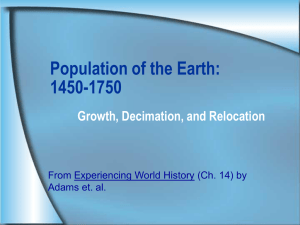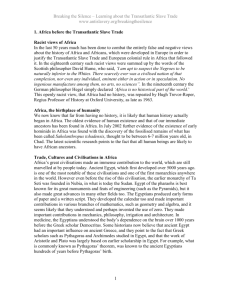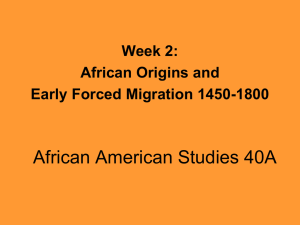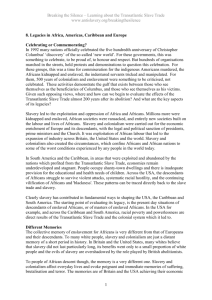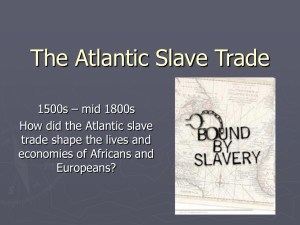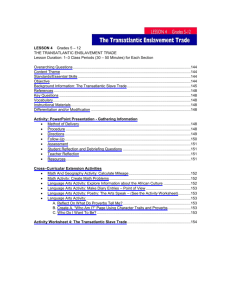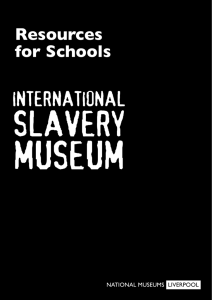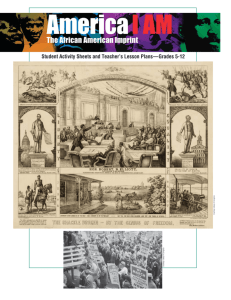Legacies of the Transatlantic Slave Trade - Anti
advertisement
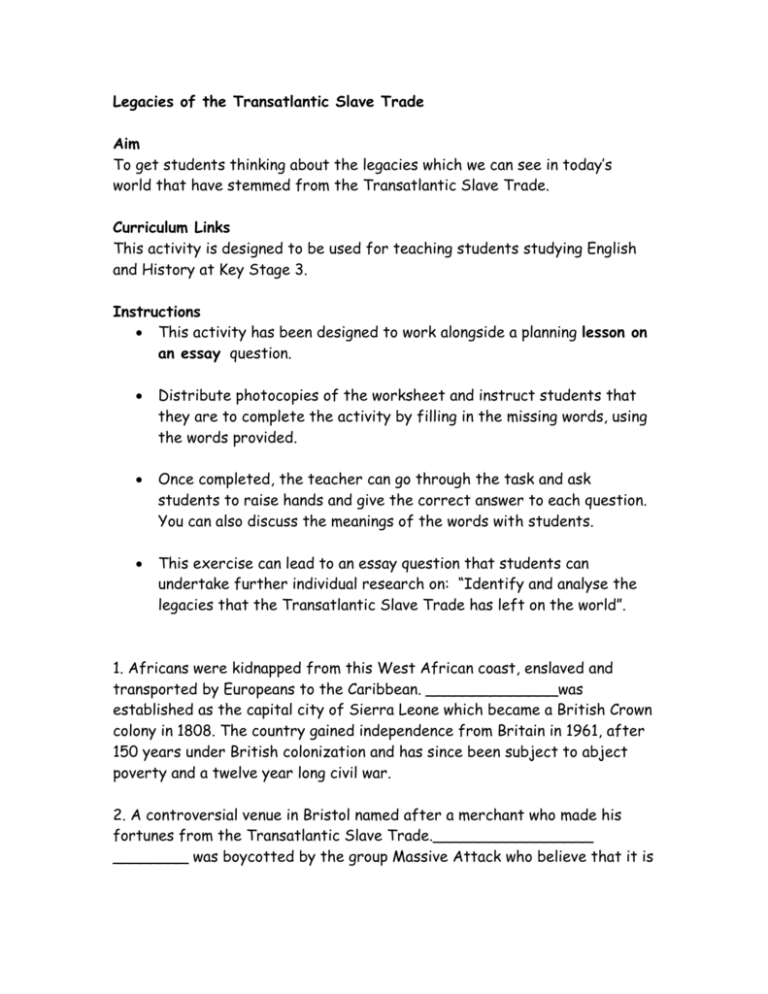
Legacies of the Transatlantic Slave Trade Aim To get students thinking about the legacies which we can see in today’s world that have stemmed from the Transatlantic Slave Trade. Curriculum Links This activity is designed to be used for teaching students studying English and History at Key Stage 3. Instructions This activity has been designed to work alongside a planning lesson on an essay question. Distribute photocopies of the worksheet and instruct students that they are to complete the activity by filling in the missing words, using the words provided. Once completed, the teacher can go through the task and ask students to raise hands and give the correct answer to each question. You can also discuss the meanings of the words with students. This exercise can lead to an essay question that students can undertake further individual research on: “Identify and analyse the legacies that the Transatlantic Slave Trade has left on the world”. 1. Africans were kidnapped from this West African coast, enslaved and transported by Europeans to the Caribbean. ______________was established as the capital city of Sierra Leone which became a British Crown colony in 1808. The country gained independence from Britain in 1961, after 150 years under British colonization and has since been subject to abject poverty and a twelve year long civil war. 2. A controversial venue in Bristol named after a merchant who made his fortunes from the Transatlantic Slave Trade._________________ ________ was boycotted by the group Massive Attack who believe that it is an insult to the memories of the enslaved Africans for tax payers to be funding a public building that bears the name of a prominent enslaver. 3. A martial art form that is gaining worldwide popularity, __________________ was initially developed in 1630 by enslaved Africans who escaped to the mountains of Brazil. From there they were attacked by Portuguese and Dutch armies, but the Africans developed a system of fighting which was a symbol of freedom. 4. The End of the Slave Trade Act 1807 abolished British participation in the slave trade but did not end the practice of slavery in the colonies. The full emancipation of enslaved Africans took place in 1838 and the African people living in the Caribbean began to host elaborate _______________________ borrowing from European traditions but with a strong African influence. This was to celebrate not only their freedom, but also to maintain some of the African dances, and songs which they had been denied from practising during enslavement. This event is practised annually in all of the Caribbean islands and the version in London has become Europe’s biggest street festival. 5. Some people believe that the African community should receive a form of compensation called ___________________ from the governments that were engaged in the enslavement of African people. _________________ is given for an insult or injury. After the abolition of slavery, plantation owners were paid £20 million for the loss of their property and the emancipated Africans received nothing to help them make a new start in life. 6. At the 1884 Berlin Conference, Africa was divided amongst the European powers who argued that this process of _________________________ would ensure that the African “natives” would become civilised, stop practices like slavery and become good Christians. ____________________ was in fact a ploy to extract valuable natural resources from Africa in order to continue the economic growth that Europe and the United States of America had become accustomed to as a result of slavery. Ghana was the first state to gain its independence in 1957 and Zimbabwe the last state in 1980. As a result most African states are only 50 years old and many of the ensuing problems faced by modern Africa directly stem from the process of ________________________. 7. The abolition of the Transatlantic Slave Trade came about for a number of reasons. Fundamentally the enslaved Africans’ continuous revolts and fight for their freedom led to a decline in profitability of the Transatlantic Slave Trade. They were supported by a _________________ _______________________ which included ordinary people and women. This was significant as women were not allowed to vote, but used their economic power to boycott sugar made by enslaved Africans and organised the signing of mass petitions. This was the first ______________________ ____________________ form of campaigning and has been adopted as a benchmark for present campaigns on a number of issues. 8. One of the legacies of the Transatlantic Slave Trade has been the systematic _____________________ faced by people of African descent in the countries where their ancestor were enslaved. In the United States of America, African-Americans were not allowed to vote till the 1965 Voting Rights Act was passed. They were segregated in ghettos and unable to attend certain schools or universities. _____________________, however is not a historical notion and still exists today in the United Kingdom, where boys of Caribbean origin underachieve at school, Black people are more likely to be unemployed and are under-represented in key institutions such as parliament, the senior judiciary and police force. 9. Enslaved Africans were taken to Europe, the Caribbean and the Americas where they now make up a _________________ community. Due to the dehumanizing process of slavery, enslaved Africans, were prevented from using their original language and bore the names of slave masters. Slavery has left African descendants in places like Jamaica, Barbados, Trinidad, Brazil and Cuba who have created new identities comprised of some memories of African culture and tradition and the European culture they encountered on their enslavement 10. The concept of ______ __________________ grew out of 19th century efforts to end slavery and the slave trade. The onset of colonialism also spurred Black people worldwide to realise that they faced common problems (slavery, colonization, and racism), and that it would be to their benefit to work together in an effort to solve these problems. This concept resulted in the creation of the Organisation for African Unity (now the African Union) which works on the same model as the European Union. Words Pan-Africanism Diaspora Mass Movement Capoeira Carnival Colonialism Freetown Colonisation Reparation Colston Hall Reparation
